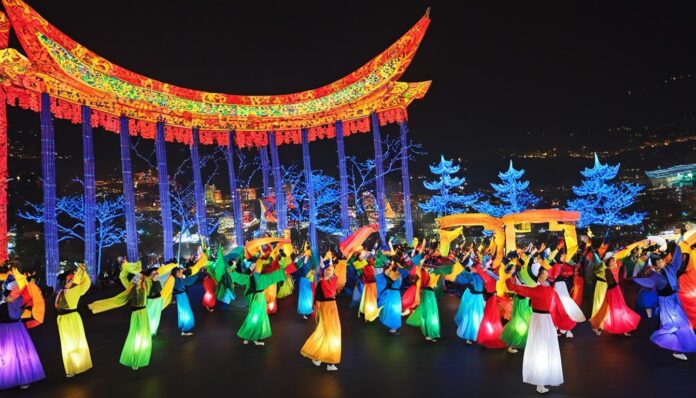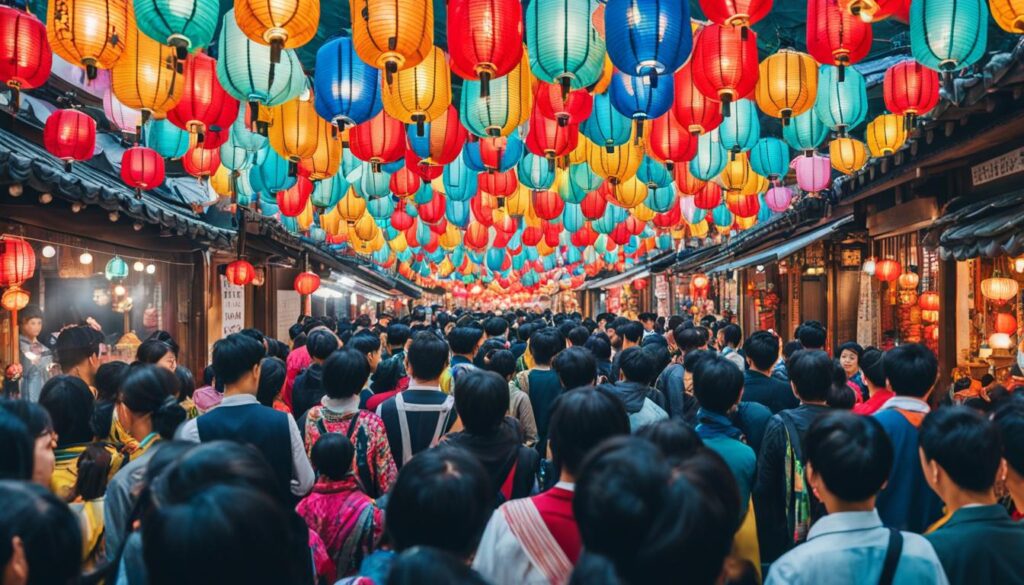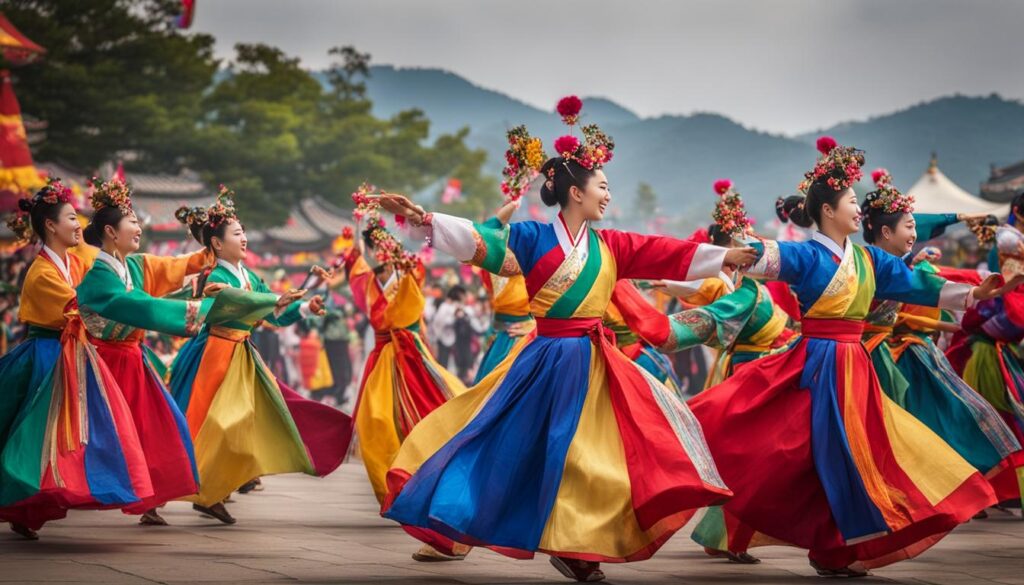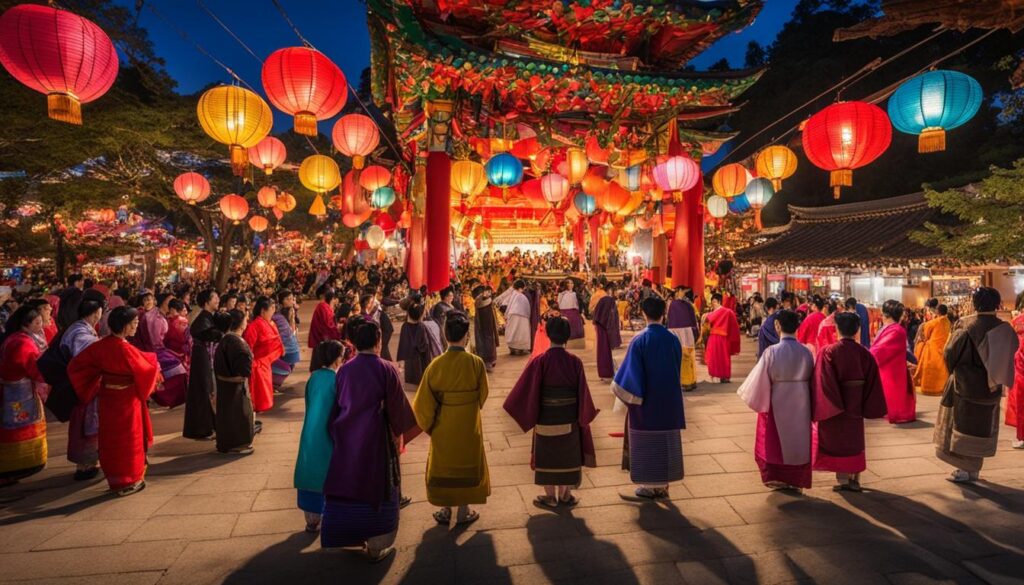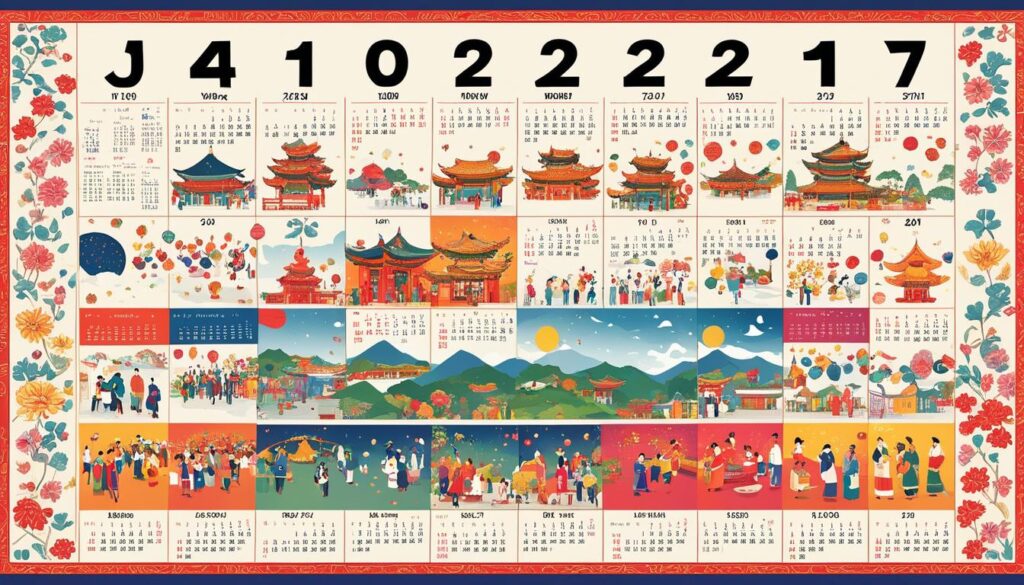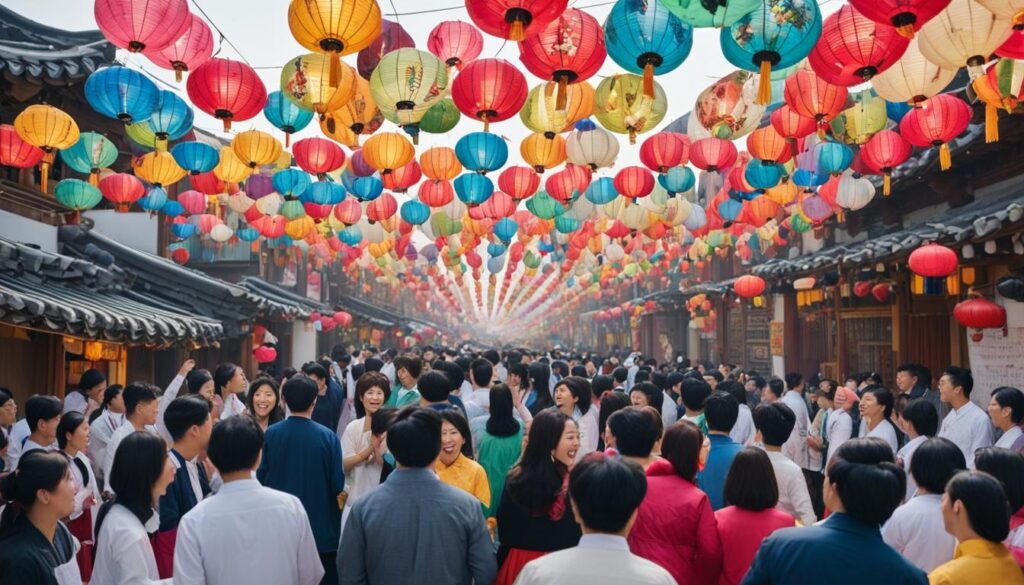Discover the vibrant and captivating world of Traditional Korean festivals and events. Immerse yourself in the rich heritage and joyful celebrations of Korean cultural celebrations. From colorful parades to ancient traditional events, Korean festivals offer a unique glimpse into the country’s customs and traditions. Whether you’re a cultural enthusiast or a casual traveler, witnessing these remarkable events is an experience of a lifetime.
Join us as we take you on a journey through the various festivals and events that make South Korea a vibrant and exciting destination. Get ready for an adventure that will ignite your senses and leave a lasting impression on your heart.
Festivals in South Korea
If you want to experience the vibrant culture of South Korea, attending one of the country’s festivals is a must. Koreans love to celebrate, and these events are a great way to get a glimpse into their customs and traditions. From colorful parades to traditional performances, South Korea’s festivals offer a unique experience that you’ll never forget.
Popular festivals in Korea include the Boryeong Mud Festival, held every summer, where thousands of visitors from all over the world come to play in the mud. Another event worth checking out is the Jinju Lantern Festival, which takes place in October and showcases traditional Korean lanterns. Movie buffs will love the Busan International Film Festival, held each fall, which is Asia’s largest film festival and showcases contemporary films from around the world.
There are many more festivals to discover in South Korea, with events taking place throughout the year. Whether you’re interested in music, food, or art, there’s sure to be a festival that will capture your interest. Plan your visit accordingly, and you’ll be able to immerse yourself in the rich cultural traditions of South Korea.
Traditional Events in Korean Culture
The culture of South Korea is steeped in tradition and history, and traditional events are a significant part of that cultural heritage. These events provide a window to the past, showcasing the fascinating mix of ancient practices and beliefs that have been passed down through generations.
A prominent example of such events is the Gyeongju Cherry Blossom Festival in early April, that celebrates the onset of spring. It is held in the ancient capital of Gyeongju, where visitors can witness cherry blossoms in full bloom while partaking in various cultural events and festivities.
The Seollal (Lunar New Year) and Chuseok (Harvest Festival) are two of the most significant traditional Korean events. Seollal, which occurs in January or February, sees families gathering together to pay their respects to ancestors, preparing traditional foods, and playing games. Chuseok, which falls in late September or early October, is the time when families pay their respects to ancestors who lived in rural areas and who were involved in agriculture.
Another important event is the Andong Mask Dance Festival, held annually in the city of Andong. It is a celebration of Korea’s masked dances, featuring colorful costumes, traditional music, and captivating performances.
| Event | Date | Location |
|---|---|---|
| Gyeongju Cherry Blossom Festival | Early April | Gyeongju |
| Seollal (Lunar New Year) | January or February | Across Korea |
| Chuseok (Harvest Festival) | September or October | Across Korea |
| Andong Mask Dance Festival | October | Andong |
The traditional events in Korean culture offer visitors a unique opportunity to immerse themselves in the country’s history and experience its rich cultural heritage. From music and dance to food and festivals, these events showcase the unique customs and traditions of South Korea.
Traditional Korean Holiday Traditions
Traditional Korean holidays are deeply rooted in the country’s rich cultural heritage and bring together families and communities for special celebrations. One of the most significant festivals is Seollal or Lunar New Year, which is celebrated in January or February depending on the lunar calendar. During Seollal, families gather together to pay respect to their ancestors and share traditional dishes such as tteokguk (rice cake soup). Children also receive sebae, a bow of respect, from their elders, and everyone plays traditional games and wears hanbok, the Korean traditional dress.
Another important festival is Chuseok, also known as the Harvest Festival, celebrated in autumn around the time of the full moon. During Chuseok, Koreans visit their ancestral hometowns, offer tribute to their ancestors, and share traditional food such as songpyeon, crescent-shaped rice cakes filled with sweet sesame paste or red beans. People also participate in various activities such as Korean wrestling, archery, and tug-of-war.
“Korean holidays are an excellent opportunity to experience the rich and unique cultural heritage firsthand and participate in traditional activities.”
Table 4: Traditional Korean Festivals
| Festival | Date | Description |
|---|---|---|
| Seollal | January or February | Also known as Lunar New Year, Seollal is a time to pay respect to ancestors and celebrate with family, traditional food, and games. |
| Chuseok | August or September | Celebrated during the harvest season, Chuseok involves ancestral rites, traditional food, and various activities such as Korean wrestling and archery. |
| Buddha’s Birthday | April or May | Commemorating the birth of Buddha, this festival features traditional lantern parades and temple visits. |
| Daeboreum | February | A festival celebrating the first full moon of the lunar calendar, featuring traditional food, rituals, and games such as yutnori. |
Overall, traditional Korean holiday traditions offer a chance to experience the country’s unique culture, customs, and practices firsthand, making them a must-see for anyone traveling to South Korea.
Korean Festival Calendar
South Korea is a country of countless festivals and events that showcase its rich cultural heritage. Plan your trip to coincide with one of the many Korean cultural celebrations by exploring the Korean festival calendar. From traditional performances to modern music festivals, delight in the vibrant celebrations that happen throughout the year.
| Festival | Month | Location |
|---|---|---|
| Boryeong Mud Festival | July | Boryeong City |
| Jinju Lantern Festival | October | Jinju City |
| Busan International Film Festival | October | Busan City |
| Hi Seoul Festival | October | Seoul City |
| Seoul Lantern Festival | November | Seoul City |
| Seoul Kimchi Festival | November | Seoul City |
| Jeju Fire Festival | December | Jeju Island |
These are only some of the Korean festival highlights. Make sure to add them to your itinerary to witness the joyful celebrations firsthand.
Celebrations in South Korea
South Korea is a land of cultural celebrations and festivities, with exciting events happening throughout the year. Whether you’re a music lover, foodie, or simply looking to soak up some local culture, South Korea has something to offer you. From traditional performances to modern music and arts festivals, there is always something happening in this vibrant country.
One of the most popular celebrations in South Korea is the Boryeong Mud Festival. Held on the west coast of the country in July, this festival is a must-see event for those seeking fun, adventure, and lots of muddy memories. Enjoy mud wrestling, mud sliding, and even mud massages, all while enjoying the lively atmosphere and music.
Another popular festival is the Jinju Lantern Festival, which takes place every October in Jinju City. This famous festival is a celebration of hope and light and features dazzling displays of thousands of lanterns floating on the Nam River. Along with the lanterns, there are traditional performances, exhibitions, and food stalls, making it a truly immersive cultural experience.
For movie fans, the Busan International Film Festival in October is unmissable. This ten-day event showcases some of the best films in Asia and beyond, attracting film enthusiasts from all over the world. Watch screenings of the latest Korean films, meet celebrities, and enjoy the lively after-parties.
No matter what time of the year you visit, South Korea has something to offer in terms of celebrations and festivals. Don’t miss the opportunity to experience the rich culture and vibrant atmosphere of these amazing events.
Korean Festival Highlights
South Korea is a hub of cultural events and traditions, and no visit is complete without experiencing the exhilarating energy of Korean festivals. From dancing to singing, these festivals bring communities together to celebrate their rich heritage and diverse culture. The following festivals are must-sees when you come to Korea:
| Festival | Description |
|---|---|
| Boryeong Mud Festival | This festival, celebrated annually in July, is a unique way to experience the cleansing benefits of mud! The highlight of the festival is the mud pool, where people can cover themselves and others in mineral-rich mud, thought to have skin-healing properties. |
| Jinju Lantern Festival | In honor of an ancient Korean hero who defended Korea from Japanese invaders, this festival is celebrated annually in October. The highlight of the festival is the beautiful lanterns that adorn the rivers and streets of the city, forming a stunning spectacle of light. |
| Busan International Film Festival | This festival is renowned for launching the careers of up-and-coming Korean filmmakers and is celebrated annually in October. The highlight of the festival is the Red Carpet event, where A-list actors and actresses from Korea and around the world strut their stuff. |
These festivals represent just a small sampling of the vibrant culture and traditions awaiting you in Korea. Be sure to visit during one of these festivals to experience the true essence of Korean heritage and celebrations.
Traditional Korean Wedding Ceremonies and Celebrations
Traditional Korean weddings are a beautiful and sacred union of two families, celebrated with customary rituals and traditions that have been passed down through generations. A traditional Korean wedding includes elaborate preparations, ceremonies, and feasts.
The Engagement
The engagement (or chinye) marks the beginning of a couple’s journey to marriage. It involves formal introductions to both families and exchange of gifts. The groom’s family visits the bride’s home with pyebaek, a ceremony where the bride bows to the groom’s family and offers them tea and rice cakes.
The Wedding Ceremony
The wedding ceremony (or taerye) involves ancient customs like the purification ceremony and bowing to the parents. The couple wears traditional wedding attire called hanbok, and their parents wear hanbok as well. The taerye includes the exchange of wedding vows, sharing of wine, and a ceremonial walk around the table.
Post-Wedding Ceremonies
Post-wedding ceremonies include the pyebaek ceremony (where the bride formally greets and receives blessings from the groom’s extended family) and the honsu ceremony (in which the newlyweds pay respects to their parents).
The Wedding Feast
After the ceremony, a feast called kuk-choo is held to celebrate the union of two families. The feast features traditional Korean dishes like bulgogi, bibimbap, and kimchi.
In conclusion, Traditional Korean wedding ceremonies and celebrations are a beautiful and intricate blend of customs and rituals. They offer a unique opportunity to experience Korean culture and witness the sacred union of two families.
Conclusion
The Traditional Korean festivals and events offer a captivating glimpse into the rich heritage and joyful celebrations of Korea’s culture. Whether you’re interested in experiencing the ancient traditions of Korean culture or simply looking for a vibrant and exciting destination to travel to, South Korea has it all. By attending festivals and events in Korean tradition, you can immerse yourself in the beauty of Korean cultural celebrations.
Celebrations in South Korea are an integral part of the country’s cultural fabric, and they serve as a testimony to the Korean people’s resiliency and joyous spirits. Visiting festivals is one of the best ways to learn about the country’s past and present, as well as to experience its unique traditions and customs. By exploring the diverse range of festivals and events that make South Korea such an exciting destination, you can gain a deeper insight into the country’s social and cultural dynamics.
So, plan your trip to coincide with these celebrations to experience the true essence of Korean traditions. Attend festivals in South Korea to get a sense of the Korean people’s love for life and their unique cultural identity. In South Korea, you will find a warm and welcoming atmosphere that will make you feel at home. Enjoy these celebrations as you learn more about Korean culture, and take back unforgettable memories of celebrations in South Korea.
With its vibrant and dynamic culture, South Korea has become an increasingly popular destination for travelers from all over the world. By attending Korean cultural celebrations and festivals and exploring the country’s rich heritage, you can discover the beauty and richness of this fascinating country.




























